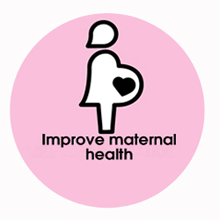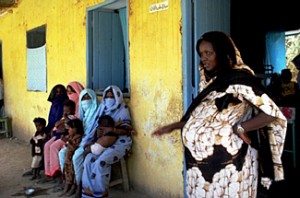Mothers play a huge role in every child’s life. A mom is a child’s support system, role model, and caretaker. From birth to first day of school to college graduation, moms are always there from the beginning to the end. Sometimes though, not all mothers in developing countries are fortunate to see their children growing up in front of their eyes. Maternal mortality is still a major issue in low-income countries despite major technological advances. Maternal mortality has a large adverse effect on a family socially, economically, and psychologically. Everyday there are about eight-hundred women that lose their lives everyday while giving birth, which is almost a total of 292,000 lives a year. Almost ninety percent of maternal deaths can be avoided with quality maternal health care. Most of those maternal deaths are women living in developing countries worldwide. Many lives can be saved if quality prenatal and postnatal care was available to all women.
Poverty is the number one reason women are unable to get the care they need during pregnancy and childbirth. Health care can be costly for many families living on a small income. Women often are unable to visit a doctor regularly because of familial duties or the clinic is simply too far away. Transportation to and from the clinic may be dangerous for women who live in far rural villages. Also, many countries do not have the resources to provide these women with maternal health services because of the lack of infrastructure and funding available. There are not enough health care workers available to provide women with quality maternal care.
Gender inequality plays a significant barrier for women who want to see seek the care that they need and deserve. In many developing countries, men play a dominant role in the household and make entirely all the decisions especially when it comes to spending. Some cultural and social norms prevent women from leaving their home and to seek care. Women are placed at the bottom of the hierarchy and because of that, their health needs are often neglected.
Why is it important to save mothers?
If the mother dies, her surviving infant will be more at risk of dying within the very first few days of life compared to infants with mothers. Without mothers, her children are less likely to go to school and get educated compared to other kids. Besides education, her children will not be able to get basic preventive health care such as vaccines on time. Overall, there will be less economic productivity in her family and community.
What we can do?
First, we can try to reduce gender inequality by empowering women. It is difficult to drastically reduce gender inequality, however we can try by working with the community to empower these women. Incentives-based programs can be effective. If a husband brings his wife to the clinic for a checkup, he can get a monetary reward. He is more likely to bring his wife to the clinic again for a check-up. Peer mentoring is also very effective tool to inform women about maternal health through social norms and cultural barriers. Second, we can advocate for low cost maternal health care for these women. If the health care cost was overall lower, many more families will be able to afford to seek care. Third, train more health care workers such as midwives in local rural villages. According to a report, adequate midwifery can save 3.6 million lives. It is important to focus on mothers because mothers can make big positive impact whether in the community or in the lives of their children.




